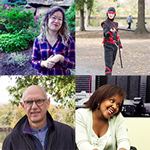Faces Behind the Screen: Betsy
Quick Links
<< Return to all “Faces Behind the Screen” stories
Being born with no hearing in one ear and partial hearing in the other ear, Betsy identifies as both hard of hearing and deaf. We met Betsy at the Hearing Loss Association of America’s New England Walk4Hearing last fall. When we spoke with Betsy, she shared with us her experience of first realizing not everyone has a good ear and bad ear, how she got involved in the Walk4Hearing, and why now is the best time to have hearing loss.
“I remember playing telephone and noticing that I had to completely turn so they’d talk in my good ear.”
Do you consider yourself hard of hearing?
Hard of hearing and deaf. But it’s funny – all my life, I never really thought about it. In my eyes, it was always like I had a good ear and a bad ear. I never thought much of it until I went to kindergarten. Sitting in the circle with the kids, I remember playing telephone and noticing that I had to completely turn so they’d talk in my good ear. I remember the significance of realizing – wait a minute – maybe everyone doesn’t have a good ear and bad ear.
“I spent about an hour crying after the walk. It just hit me like, ‘wow!’”
Do you ever feel like there is a miscommunication because of failure to understand?
My whole life. I discovered Walk4Hearing five years ago because I started losing hearing in my good ear, and I freaked out. Then I was like, “What if I go deaf?” Then I thought, “Wait a minute, you already are.” Then just the magnitude – when I gained the knowledge and information of understanding what happens – the ramifications of “the invisible disability” – I remember I spent about an hour crying after the walk. It just hit me like, “wow!” It made me feel so normal and complete – I understand why I am the way I am. I also felt sadness for the misfortune my family had been dealt; never had we been given or seen any of these simple communication strategies, like, “communication isn’t successful if a person with hearing loss is in a different room when talking.”
“I can’t think of a better time to have hearing loss than now.”
How do you feel technology helps or hinders your ability to communicate?
I just thought about it when I went to the National Hearing Loss Association and saw some of the technology. I can’t think of a better time to have hearing loss than now. Bluetooth is unbelievable, and just the simple stuff that’s been around – like the t-coil. With the t-coil, most hearing aids and cochlear implants have a piece of copper in them. If you put a piece of copper around a room and hook it up to a microphone, the sound travels around and when it hits your hearing aid or implant, it is signaled to dump the sound in your ear. It’s been around for a while, but it’s not utilized in the US the way it is in Europe. But it allows people to go to plays, shows, lectures, church, etc.
“I know it’s shaped me as a person. I’m a good listener. It’s not something I would want to change.”
What would you say is the best part about being deaf?
I think it’s been a blessing when I don’t want to hear anything I’d block my good ear. Growing up – when I couldn’t listen to [my parents] anymore, I’d just stick one finger in, and they’re all gone. Can’t hear them. I know it’s shaped me as a person. I’m a good listener. It’s not something I would want to change.
“It’s so important to look at people directly and get someone’s attention – not by screaming at them – but by a simple tap [on the shoulder].”
What would you like hearing people to know about how better to communicate with people who are d/Deaf?
I’d like them to know that it’s so important to look at people directly and get someone’s attention – not by screaming at them – but by a simple tap [on the shoulder]. And talking to someone in a different room – you’re never going to communicate. Just really looking at people, and if someone doesn’t understand what you’re saying, try another phrase. Don’t keep repeating it. Really, truly, just looking at people and getting their attention before you launch.
—
A huge ‘thank you’ to the Hearing Loss Association of America (HLAA) for hosting this series of interviews at the New England Walk4Hearing in Fall of 2016. Click on the image below to read more stories on the main site.
Faces Behind the Screen is a storytelling project focusing on members of the Deaf and hard of hearing community.





